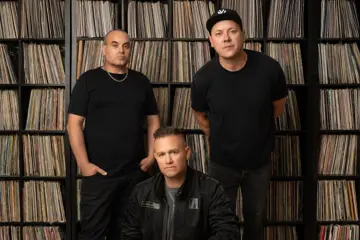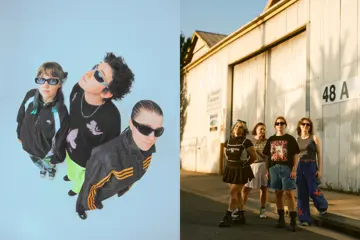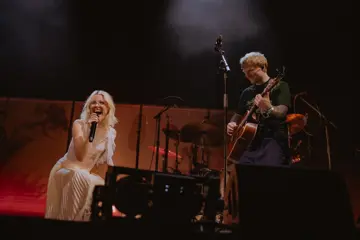Jess Day’s latest release, A Garden of Small Disappointments, sees the indie-rock singer/songwriter lean into an uncompromising sound. Moody and self-assured, Day is incensed by a mottled deluge of emotions, and seems to find catharsis from wounds old and new in a winking, angsty rock disposition on this album, which has been a decade in the making.
With raw candour, Jess Days opens up about A Garden of Small Disappointments.
“These songs have been with me for years,” she says. “They withstood the test of time and still resonated with me.”
She expands on the title of the album - a poignant metaphor. “As children, we’re promised a garden of fertile, abundant opportunities. But by the time we reach our late twenties, it often feels like we’re looking at a withered garden of failures.” This sentiment is woven throughout the album, with each song representing a small disappointment - whether in relationships, friendships, or careers - that Day has transformed into art.
A Garden of Small Disappointments is a ten-track album, beginning with Old Wounds and ending with The Portal. The track list curation was meticulous, crafted to ensure a seamless flow, both sonically and thematically. “I wanted the songs to transition smoothly into each other,” she explains. “Old Wounds felt like the perfect introduction, and The Portal - an epic conclusion.”
The Portal was written during a period of acute grief, despair, and anger whilst witnessing the struggles of the women around her - issues such as endometriosis, PCOS, and PMDD, to name only a select few. “It was clear how misunderstood women’s bodies are,” Day says. “Medicine has often neglected us, even though we’re half of the population.”
Don't miss a beat with our FREE daily newsletter
This frustration and sense of injustice fueled The Portal, a powerful anthem that captures Day’s emotions and experiences. “I needed a place to put all that anger,” she says.
The middle section of the album sees what Day refers to as a “trio of transformation,” including the three songs London, Softness, and Lilith.
She explains how these tracks are pieced together to tell a cohesive story. London is an upbeat, almost childlike song that contrasts with its mature theme of accepting one’s attraction to melancholic, troubled people. “I’ve reckoned with that part of myself,” Jess says. “I choose otherwise now.”
On Softness, Jess explores the discomfort of being in a healthy relationship. “It’s that shock of being in a functional relationship and feeling an innate desire to ruin it because it’s unfamiliar,” she explains. “Softness is about being painfully self-aware of these unhealthy thoughts and beginning to understand why.”
Finally, Lilith draws inspiration from the story of Lilith and Adam in the Garden of Eden. “Lilith is cast out for refusing to be subservient to Adam,” Day says. “It’s about excessive independence and choosing solitude over the emotional risk of relationships.” Day also mentions how reading Circe by Madeline Miller influenced this song, drawing parallels between Circe’s and Lilith’s journeys of self-reliance and fleeting romantic encounters.
Drinking For Two is the oldest song on the album, written when she was merely 18. “I was really depressed at the time,” she recalls. “It was a new kind of depression, scary because you don’t know when it will end.” The song captures the pain and confusion of that period, with lyrics that reflect carrying the weight of past selves and failed potential. “I owed it to myself to record that song. It still holds up and I still relate to it.”
On the topic of mental health, Day discusses how many women are diagnosed with autism later in life - something that she herself experienced. “Music was a way to externalise the incredibly lonely experience of being undiagnosed growing up - which I didn’t really understand until I was diagnosed as an adult,” she says. “I also believe that neurodiverse people often have a profound connection with music.” She also believes that her neurodivergence has been a driving force in her music career, noting that many creative individuals share similar experiences.
She has, however, struggled to forge a fully healthy relationship with her own creativity.
“I used to feel that music was the only reason for my existence, and that was suffocating,” she admits. “Now, I create because it has value to me. If it resonates with others, that’s a bonus. I don’t need mass validation; I just need to know it was meaningful for a few.”
Jess Day recorded the majority of the album on her own, a choice born out of both necessity and preference. “I thought I’d have a well-oiled production line by now, but I often found myself disappointed,” she says. “The phrase ‘if you want something done right, do it yourself’ kept proving true.” Day realised she could handle most of the work herself, only outsourcing tasks like mixing to trusted collaborators like Jared Nettle.
She reflects on the challenges of advocating for her creative vision, especially as a young woman in the music industry. “I often felt undermined and had to fight for my ideas,” she says. “But I’ve learned that the only one who can truly execute your vision is yourself.”
Day recounts how her music was often boxed into a pop sound by male producers, despite her rock roots. “They saw me as a solo female artist and quickly boxed me into something pop adjacent,” she says. “This album allowed me to lean into my true rock sound.”
Day is passionate about advocating for women in rock. She encourages young women to stand up for their creative ideas and not be afraid to take control. “There were many small moments where I had to assert myself,” she recalls. “It’s important to trust your instincts and fight for your vision.”
As Day prepares to take her album on tour, she is confident in how well the songs will translate live. “We’ve already started practising, and the songs sound great,” she says. “They translate incredibly well into live performances because they’re band songs, largely guitar-driven.”
She is particularly excited about reconnecting with her audience after years of recording. “I haven’t played shows in years,” she says. “Recording feels like a day job you’re not getting paid for. Playing live is what fills my cup. It’s a reminder of why I’m doing this in the first place—to reach people.”
Playing live is especially rewarding for her, in the age of social media and algorithms. “At a live show, you’re looking out at real people, knowing you’re connecting with them. That makes it worth it.”
The album release will see Day bring her band together to hit the road in November. Tickets for various show dates across the country are available now.
A Garden of Small Disappointments is more than just an album; it is a journey through Jess Day’s life, filled with raw emotions and personal reflections. Each song is a testament to her resilience and creativity, turning small disappointments into something beautiful and meaningful.
This piece of content has been assisted by the Australian Government through Music Australia and Creative Australia, its arts funding and advisory body

















